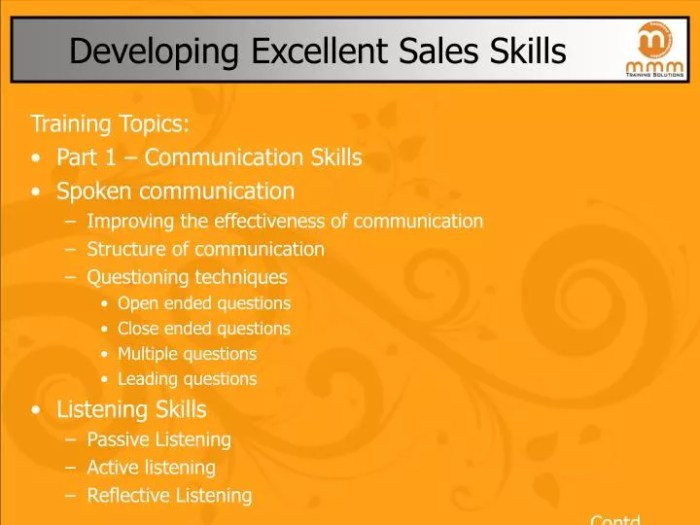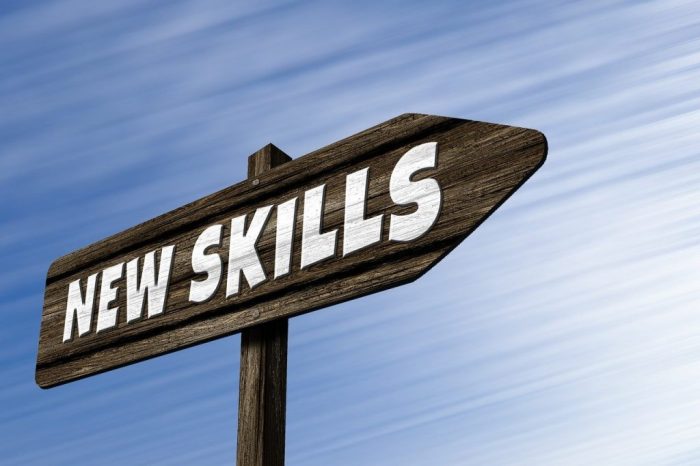Developing Sales Skills: Mastering the Art of Selling opens the door to a world where charisma meets strategy, where every pitch is a chance to shine. Get ready to dive into the realm of sales mastery like never before.
This guide will take you through the essential skills needed to excel in sales, from active listening to closing deals with finesse.
Importance of Developing Sales Skills
Developing sales skills is crucial for professionals in various industries as it allows them to effectively communicate the value of their products or services to potential clients. Strong sales skills can positively impact a company’s bottom line by increasing revenue through successful sales conversions. Additionally, having effective sales skills can open up career advancement opportunities by showcasing an individual’s ability to drive business growth and achieve targets.
Enhanced Communication
- Being able to effectively communicate the benefits of a product or service to a potential customer can lead to increased sales and revenue.
- Strong sales skills enable professionals to build rapport with clients, understand their needs, and offer tailored solutions.
- Effective communication skills can also help in negotiating deals and closing sales successfully.
Business Growth
- Professionals with strong sales skills can contribute significantly to a company’s growth by driving sales and expanding the customer base.
- Increased sales resulting from effective sales techniques can lead to higher profits and overall business success.
- Sales skills are essential for identifying new opportunities, converting leads, and retaining customers for long-term business relationships.
Career Advancement
- Individuals who excel in sales are often recognized for their contribution to the company’s success and may be considered for promotions or leadership roles.
- Having strong sales skills can set professionals apart in a competitive job market and open doors to new career opportunities.
- Sales skills are transferable across various industries, allowing professionals to pursue diverse career paths and explore different sectors.
Key Sales Skills to Develop

Developing key sales skills is crucial for success in the competitive world of sales. By honing these essential skills, sales professionals can increase their effectiveness and achieve their targets more efficiently.
Active Listening
Active listening is a fundamental skill that involves fully concentrating, understanding, responding, and remembering what is being said. By actively listening to customers, sales professionals can uncover their needs, concerns, and preferences. This allows for a more tailored approach in offering solutions that meet the customer’s requirements.
Negotiation, Developing Sales Skills
Negotiation skills are essential in sales as they enable professionals to reach mutually beneficial agreements with customers. By mastering negotiation techniques, salespeople can effectively handle objections, find common ground, and close deals successfully. This skill is vital in building long-term relationships and fostering customer loyalty.
Relationship Building
Building strong relationships with customers is key to sustaining a successful sales career. By establishing trust, rapport, and credibility, sales professionals can create lasting connections that lead to repeat business and referrals. Effective relationship building involves understanding the customer’s needs, providing value-added solutions, and maintaining open communication channels.
Mastering Communication Skills
Effective communication is at the core of successful sales interactions. By mastering communication skills such as clarity, empathy, and persuasion, sales professionals can engage customers effectively and convey the value of their products or services. Clear and concise communication helps in building trust and credibility with customers, ultimately leading to higher sales performance.
Understanding Customer Needs
Understanding customer needs is essential for tailoring sales strategies and solutions. By conducting thorough research, asking probing questions, and actively listening to customers, sales professionals can gain valuable insights into what motivates their buying decisions. Adapting sales strategies accordingly to meet these needs results in more meaningful interactions and increased sales success.
Strategies for Improving Sales Skills
To enhance your sales skills, it’s essential to utilize various strategies that focus on continuous improvement and feedback. By incorporating different training methods, setting realistic goals, and seeking feedback, you can refine your techniques and become a more effective salesperson.
Training Methods
Workshops, role-playing exercises, and mentorship programs are valuable tools for improving sales skills. Workshops provide opportunities to learn from experts in the field, while role-playing exercises allow you to practice different sales scenarios in a safe environment. Mentorship programs offer personalized guidance and feedback from experienced professionals, helping you refine your approach and strategies.
Setting Realistic Sales Goals
Setting achievable sales goals is crucial for measuring progress and improving skills continuously. By establishing specific, measurable targets, you can track your performance and identify areas for growth. It’s essential to break down larger goals into smaller, manageable tasks to stay motivated and focused on improvement.
Seeking Feedback
Feedback from peers, managers, or customers is invaluable for refining sales techniques. Constructive criticism and suggestions help you identify strengths and weaknesses in your approach, allowing you to make necessary adjustments. By actively seeking feedback and implementing changes based on input, you can enhance your sales skills and achieve better results.
Real-Life Applications of Sales Skills: Developing Sales Skills

In the business world, strong sales skills are often the driving force behind significant growth and success. Sales professionals who excel in their roles can make a substantial impact on the company’s bottom line. Let’s explore some real-life applications of sales skills and how they can lead to business success.
Success Stories of Strong Sales Skills
- One success story is of a salesperson who used their excellent communication skills to build strong relationships with clients, leading to increased sales and customer loyalty.
- Another example is a sales manager who effectively coached their team on negotiation tactics, resulting in higher deal closures and revenue generation.
Empathy and Problem-Solving in Sales Interactions
- Empathy plays a crucial role in sales as it helps sales professionals understand the needs and concerns of customers, leading to more personalized and effective solutions.
- Problem-solving skills enable salespeople to address customer issues and objections proactively, turning challenges into opportunities for successful sales interactions.
Transferability of Sales Skills
- Sales skills are highly transferable across different industries and roles, as the core principles of effective selling remain consistent regardless of the product or service being offered.
- Professionals in marketing, customer service, and even leadership positions can benefit from developing strong sales skills to enhance their ability to persuade, influence, and negotiate effectively.





